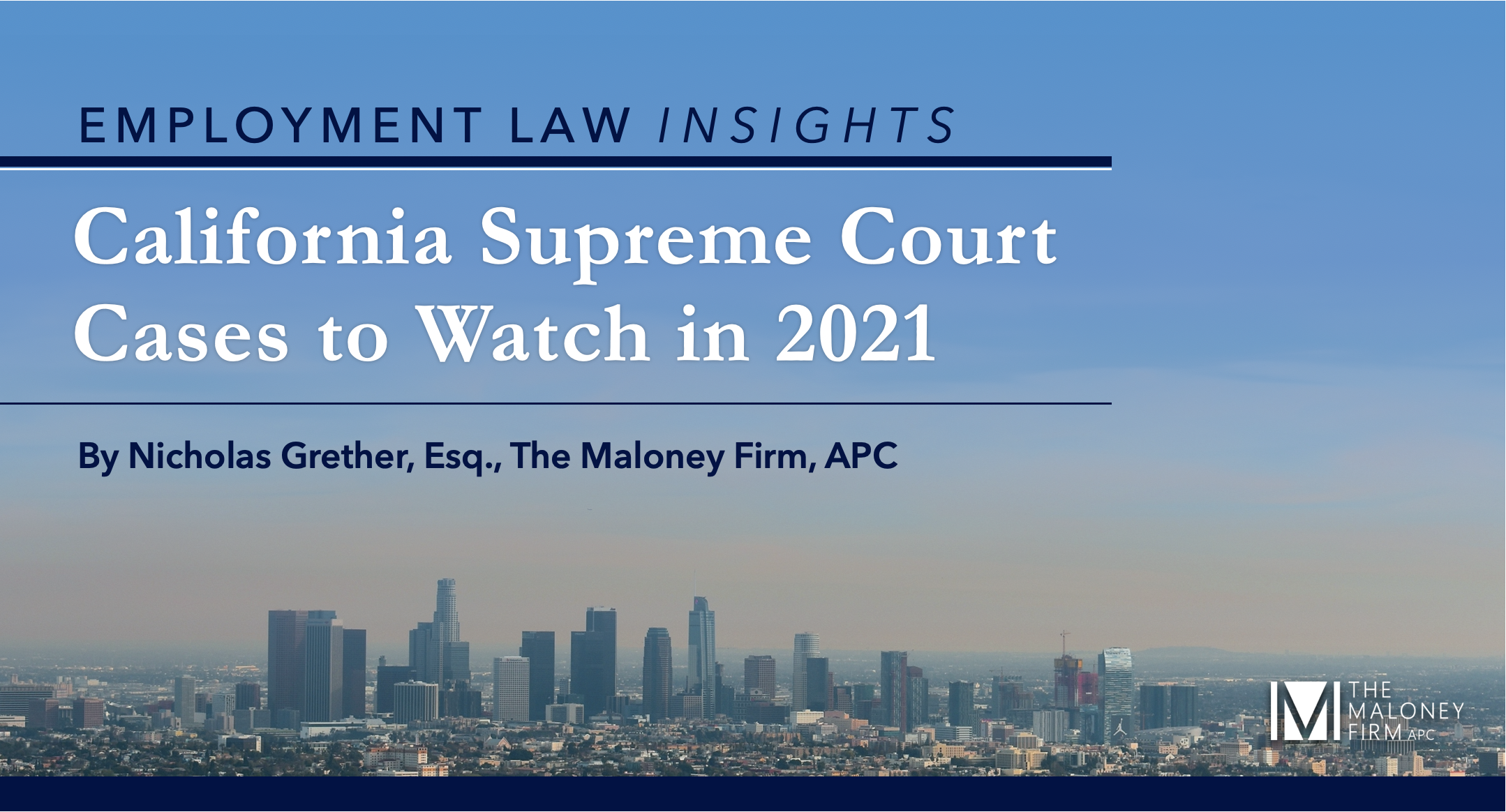California Supreme Court Cases to Watch in 2021
Apr 19, 2021By Nicholas Grether, Esq., The Maloney Firm, APC

The California Supreme Court’s calendar is unpredictable, but there are a couple of cases that bear watching for California employers in 2021. Both of these cases are fully briefed and are awaiting their time for oral argument in front of the California Supreme Court. Both have implications on the premium wages that employers must pay when employees do not receive a compliant meal or rest break.
.
Naranjo v. Spectrum Security Services, S258966
.
In this case, employees experienced a meal and/or rest break violation, but no premium wage was paid as a penalty. The Court is deciding if an employee is owed derivative penalties flowing from the failure to pay a premium wage. One argument routinely made in wage and hour cases is that the failure to pay premiums for meal or rest break violations renders the wage statement inaccurate. Employees would then be entitled to additional penalties when their wage statement is inaccurate. Similarly, an argument is made that any unpaid premium wages subject the employer to a penalty for failing to pay all wages upon termination of employment.
.
Employers, on the other hand, argue that the wage statement is accurate, as it shows what was actually paid to the employee. They also argue that there is usually a good faith dispute as to whether premium wages were actually owed, thus they could not possibly put this information on a wage statement.
.
Additionally, attorneys for employees argue that, upon the end of employment, as a result of unpaid meal or rest break premiums, the employee has not been paid in full. Thus, additional “waiting time penalties” are owed to employees who do not receive their final check in a timely fashion upon the end of employment, whether by termination or resignation.
.
Plaintiffs’ attorneys will surely be hoping that failing to pay a premium wage leads to these derivative penalties. Employers will hope that the court will not punish them for what is potentially a good faith dispute as to whether or not a premium wage is even owed. This case bears watching as a single violation may end up being worth a far more significant amount in damages.
.
Ferra v. Loews Hollywood Hotel, S259172
.
The primary issue in this case centers around determining how to properly calculate premium wages when an employee does not receive a compliant meal or rest break. Attorneys for the employer argued that any premium wage due should be calculated at the employee’s base rate of pay, without additional compensation built in. Unlike overtime, they reasoned that the premium wage for a missed break is not additional compensation for hours worked, so it should not be treated like overtime. The employees’ attorneys argued that meal and break premiums should be calculated the same way as the regular rate in the context of calculating overtime.
.
In general, before calculating overtime, an employer must determine the employee’s regular rate. The regular rate of pay includes hourly earnings, salary, piecework earnings, flat sum bonuses, commissions, and any other non-discretionary income. As an example, if an employer gives a $100 bonus for working on the weekend, that has to be included in the regular rate, because that bonus would be additional wages earned by the employee for their work. Once the additional earnings are factored in to calculate the regular rate, employees earning overtime wages receive 1.5x or 2x that rate, depending on the number of hours worked that day or week.
.
On the other hand, when a bonus is purely discretionary, those additional earnings do not have to be factored in to find the regular rate. Calculating premium wages in the same fashion would lead to higher premium wages owed when an employee does not receive a compliant meal or rest break.
.
The Appellate Court agreed with the employer’s attorneys and found a distinction between the terms “regular rate of pay” and “regular rate of compensation.” This distinction meant that employees receive their base hourly rate for any meal/rest break premiums, absent any additional non-discretionary income.
.
The California Supreme Court will clarify exactly what an employer must account for when it does pay a premium wage for a meal or rest break violation. Both sides have reasonable arguments, and while the going rate for premium wages may go up, this ruling will at least provide clarity for everyone involved.
.
What Can Employers Do?
.
Given that these cases have the potential to increase exposure for meal and rest break violations, employers should ensure they have policies and procedures in place to prevent violations and, when appropriate, pay the applicable meal or break premium to the employee. Providing proper meal and rest breaks to employees ensures that they are properly rested and serves as the best defense to such claims. Employers should also be mindful that if they include any non-discretionary bonuses when paying hourly employees, these may need to be included when calculating premiums owed. While employers likely are relying on the current state of the law in good faith, they should be prepared if the California Supreme Court reverses course.
.
About the Author:
Nicholas Grether is an employment attorney in the Employment Law Department at The Maloney Firm, APC. If you have questions regarding this article, contact Nicholas Grether at ngrether@maloneyfirm.com.



